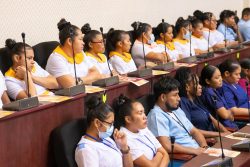The fact that political control of the state-owned media in Guyana has, over time, ceased to be a matter of any meaningful national debate is a reflection of the extent to which we have come to accept the reality that control of both the administrative and operational levers of those media houses that are funded by our ‘tax dollars’ has become a fait accompli.
If there used to be a time when pronouncements on the issue of media freedom used to centre, to a much greater extent than is the case, on the need for the conventional state media houses (print, radio and television) to reflect a much greater objectivity in their reporting, we have drifted into what one might call a more combative zone, that includes the emergence of a much broader swathe of privately-owned ‘media houses,’ the advent of which has been enabled by universal advancements in communication technology. These are more numerous, more versatile and certainly much more difficult to subject to the conventional forms of censorship. By far their most important contribution to information dissemination has been their proven capacity to roll back the frontiers of interventions that inhibit the free flow of information.
The official response of the successive political administrations to transformations in the technology that drives the growth of the contemporary swathe of ‘free media’ has been, to adopt some of those as tools which they fashion to suit their own ends. The problem that they (governments) face, however, has to do with the fact that the nature of these relatively new communication technologies render them more difficult to be brought under any kind of limited control.
There can be no questioning the fact that the various forms of censorship that applied and were effective as recently as a few decades ago have now become altogether unworkable these days.
Two distinct media freedom-related developments have emerged from the still evolving technological growth of the media. The first is the physical/technological challenges associated with contemporary attempts to curtail media freedom. The second related development has been the creation of a more level playing field in terms of public access to reliable information (the downside of this, of course, has been the danger of distortions). The bottom line here, however, is that technology, to which there is now global access, has all but completely eroded the monopoly which governments concerned with manipulating the dissemination of information once enjoyed. These days, the battle for hearts and minds is being fought on a much more level playing field than used to be the case even a few decades ago, and it is here that governments concerned with massaging and manipulating information are under pressure to refashion their strategies.
In the instance of Guyana the technological transformations have had a profound impact on freedom of information. If some of the tools for media manipulation still remain, there can be no question that it is media freedom, much more than state control of information that has been the beneficiary here in Guyana
In the instances of successive political administrations here in Guyana the most noteworthy outcome of media manipulation by the state has been to incrementally erode the credibility of those media houses.
Technological transformations in the nature of contemporary tools that manage information dissemination have given rise to a significantly enhanced level of competition in the battle for ‘hearts and minds.’ In Guyana, as much as elsewhere in the world, the potency of state-disseminated information has been eroded by universally available communication tools that are beyond the control of government and by definition virtually censorship proof.
In essence, political administrations in Guyana (and elsewhere) have had little choice but to seek other forms of media control that can at least attempt to ‘compete’ with the various forms of universally available technology, including a common cellular phone, which, arguably more than any other technological tool, has served to storm the ramparts of governments’ control of the dissemination of information.








